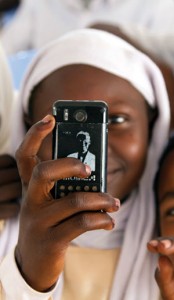EXCITING ADVANCES:
First Mobile Phones, Now Mobile LivesNovember 28, 2012
 Mobile phones have forever changed our way of life. Gone are the days of phones for just talking. Applying mobile technology as a development tool is now making new and significant contributions.
Mobile phones have forever changed our way of life. Gone are the days of phones for just talking. Applying mobile technology as a development tool is now making new and significant contributions.
In International Development, the term “mobile,” shortened to “m,” has been popping up everywhere. There is mEducation, mAgriculture, and mHealth, just to name a few. Creative recognizes the important role mobile phones can play in development by connecting people to important information and resources that can dramatically improve their economic opportunities and allow them to be more active, knowledgeable and empowered citizens.
mMoney, mLearning, mData Collection, and mAgriculture are a few areas that Creative is especially excited about.
 Mobile Money
Mobile Money
Throughout the developing world very few citizens have access to a formal bank account and instead conduct all their transactions and keep much of their wealth and savings in cash. Advances in mobile banking have opened the opportunity for easy, efficient, secure money transfers whether sending remittances to family members, purchasing goods from a supplier or paying utility bills. The biggest success story in mMoney so far has been M-PESA in Kenya, but the technology also has had a big impact in Tanzania, the Philippines, Haiti, and Afghanistan. For Creative, mMoney opens up the opportunity to make more transparent and secure transactions in transition countries where we work. Also exciting is the possibility for mobile money to give women greater control over their personal finances and financial transactions.
 Mobile Learning
Mobile Learning
Having a mobile device in your pocket opens you up to a world of information. People can instantly access resources such as Wikipedia or the Kahn Academy. Even when only simple mobile phones are available children can be engaged by mobile games that allow for reading or math practice and SMS can be used to send someone basic information on a topic and also to quiz them on their understanding. In countries where reading materials are scarce mobile devices have the potential to provide access to books much more cheaply and easily then producing and shipping paper books.
 Mobile Data Collection
Mobile Data Collection
Data collection for project monitoring and evaluation is an important part of any development program. Historically, this has meant enumerators going out with large stacks of paper surveys. Today mobile devices have allowed for new models and techniques for data collection. With a smartphone, anyone can capture a picture and the GPS coordinates of a project site and send back notes. Using SMS, implementers can solicit feedback on projects from beneficiaries and community stakeholders and then apply that information to inform real-time decisions. Also, today a diversity of are tools available, such as Episurveyor, that are a user-friendly and cost effective way of conducting surveys using mobile devices.
 Mobile Agriculture
Mobile Agriculture
Mobile interventions targeted at farmers aim to deliver real-time and targeted information that can help them decide when and what to plant or when to harvest and when to sell. These updates include sending information over SMS about current market prices and weather forecasts. Some countries also have set-up interactive farmer helplines that allow them to communicate with agricultural experts to get information on crop diseases and advanced farming techniques. This valuable technology has helped farmers to increase their yields and get higher prices for their crops.
